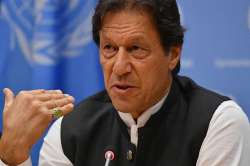Pakistan in debt trap, each Pakistani owes Rs 1.53 lakh
The per capita debt in Pakistan jumped 28 percent to Rs 153,689 at the end of last financial year, the Finance Ministry informed the National Assembly while confessing that all budget strategy targets were missed and that caused faster accumulation of public debt.

The per capita debt in Pakistan jumped 28 per cent to Rs 153,689 at the end of last financial year, the Finance Ministry informed the National Assembly while confessing that all budget strategy targets were missed and that caused faster accumulation of public debt. In its annual fiscal policy statement 2019-20, it revealed the current expenditure remained at 19-year high in 2018-19. Compared with this, the development spending was at the 11-year low, the Express Tribune reported on Sunday.
The statement was tabled in the National Assembly along with the debt policy statement to fulfil the Fiscal Responsibility and Debt Limitation Act's requirements. Like the Pakistan Muslim League-Nawaz (PML-N), the Pakistan Tehreek-e-Insaf (PTI) government too has breached the debt reduction limit.
Ashfaq Hasan Khan, former Director General of Debt and author of the FRDL Act, said after 2008 every government had breached the debt reduction limit.
The fiscal policy statement showed public debt at Rs 32.7 trillion and the per capita public debt at Rs 1,53,689 at the end of June 2019. The Ministry worked out per capita debt assuming the population at 212.8 million.
In June 2018, the public debt was Rs 24.9 trillion and the per capita debt Rs 1,20,099. Within one year, the per capita debt increased by 28 per cent to Rs 33,590. Compared with September 2019, the per capita debt has increased to Rs 1,60,000.
The public debt increased by Rs 7.8 trillion in 2018-19. Of this, Rs 3.7 trillion was borrowed for meeting the federal budget deficit. Rs 3.1 trillion debt was added due to currency depreciation and Rs 927 billion to keep higher cash balances necessary for cash management as the government was committed to zero borrowing from SBP, it added.
The analysis of situation depicts a gloomy picture and suggests Pakistan has been in a deep debt trap and the government doesn't have a strategy to correct imbalances.
In 2019-20, the government tried to correct the fiscal course by setting the FBR revenue collection target at Rs 5.5 trillion. But results remained dismal in the first seven months and the FBR Chairman - the man Prime Minister Imran Khan trusted to achieve the unrealistic target -- seems to be on his way out.
According to the Ministry, 2018-19 indicators were one of the worst in recent years. The real economic growth was 3.3 per cent, the lowest in six years. The budget deficit at 8.9 per cent of the GDP was the highest in over three decades. It was only twice in the three decades the deficit came close to 9 per cent. In 2011-12, the deficit was 8.8 per cent.
The total expenditure stayed at 21.6 per cent of the GDP. But the expenditure shot up to 19-year high of 18.4 per cent and the development expenditures slipped to 11-year low of 3.2 per cent. In 2008-09, the development expenditure was at 3.5 per cent.
The revenue slipped to 6-year low of 12.7 per cent and the tax revenue was at 11.6 per cent. The non-tax revenue slipped to 30-year low of 1.1 per cent.
The Ministry said in 2018-19 key aspects of the budget strategy were limiting fiscal deficit at 4.9 per cent of projected the GDP, rising consolidated revenue to Rs 6.3 trillion, improving tax to the GDP ratio to 13.9 per cent and rationalisation of expenditure and to improve the efficiency of the tax machinery by removing anomalies and distortions.
All these goals were missed and the budget deficit was 82 per cent higher. The consolidated revenue was at Rs 4.9 trillion or 78 per cent of the target, the tax-to-GDP ratio lower and the current expenditure hit 19-year high.
The grim fiscal situation is eating up the already thin revenue and there is little fiscal space to spend on human and infrastructure development.
ALSO READ | Pakistan imposes total ban on advertisement of tobacco products
ALSO READ | Pakistan's January inflation surges to 14.6%, highest in 12 years